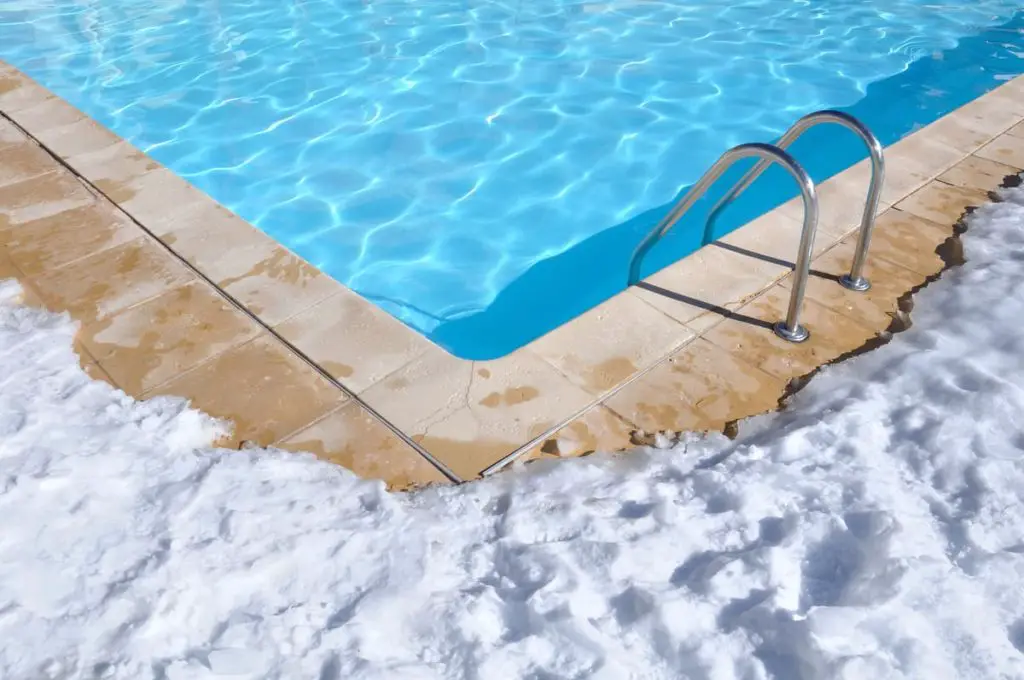Saltwater pools are often easier to take care of than traditional chlorine pools. But what about in the colder months? In this regard, it turns out that chlorine pools and saltwater pools are not very different from one another, after all.
Saltwater pools need to be winterized. Even if the temperatures in your area never reach freezing, you should winterize your saltwater pool. Salt doesn’t make your pool’s equipment and water immune to low temperatures. Also, you should take care of the pool whenever the season changes.
Below is more information about the science behind a saltwater pool. I’ll also discuss what you should remember when winterizing a saltwater pool. Keep reading.

Winterizing Helps Prevent Saltwater Pools From Freezing
A common thought about saltwater pools is that the salt will keep the water from freezing as it does in the ocean. However, on average, a saltwater pool will contain about ten times less salt than the ocean. This difference in salt concentration means that saltwater pools can freeze at average freezing temperatures while the sea won’t.
But even with significantly less salt in your pool, you’ll still get some of the benefits you find in the ocean (just not as far as winterization goes).
For example, your hair won’t turn green no matter how much time you spend in the water. You also won’t have to deal with traditional pools’ “chlorine smell.” Instead, you’ll probably be reminded of the seaside when you step in for a swim!
How Does My Saltwater Pool Differ From a Chlorine Pool?
Your saltwater pool differs from a chlorine pool in terms of maintenance. Unlike a chlorine pool that requires regular cleaning maintenance, a saltwater pool doesn’t need to be cleaned as often. However, both systems clean themselves by the same chemical process.
A saltwater pool disinfects the water by turning the salt into chlorine using a salt-chlorine generator. All you need to do is put the salt in the pool and let your generator do the rest. Most people find this easier than regularly adding chlorine tablets themselves, as direct contact with the chemicals is not often the general preference.
Another contrast between saltwater and traditional chlorine pools is the gentler effect on hair and skin. Because the chlorine in a saltwater pool occurs more naturally, it will be less harsh on the body without compromising pool cleanliness. A saltwater pool will also be milder on swimsuits, meaning they won’t become baggy and fade like they often do in more harshly chlorinated environments.
Winterizing for Saltwater and Chlorine Pools Aren’t Much Different
Winterizing a saltwater pool is almost the same as winterizing a chlorine pool. The main difference you have to worry about will be winterizing your saltwater chlorine generator so that it doesn’t break or corrode in cold weather.
Some argue that it’s best to remove the generator from the pool altogether and store it somewhere dry for the winter. Still, it would be wisest to refer to the unit’s operation manual for specific instructions.
It’s important to make sure that your pool is as clean as possible and that anything that could break through freezing—such as pipes—be cleared of water. You should do these things even if you don’t live in a climate where freezing temperatures occur.
Bacteria and algae can grow almost anywhere if given enough time, and since you won’t use your pool for at least a few months, you should take all recommended precautions.
When Is a Good Time To Winterize Your Pool?
Winterizing your pool once the water temperature stabilizes below 65°F (18°C) is a good time, as told by experts. You’ll have to keep a wary eye on the weather in the fall, but try not to winterize your pool too early. Doing so can damage your pool just as much as winterizing too late.
The winter chemicals for the pool will only last a certain number of months. If you put them in too early, you risk algae or other unwanted growths in the spring.
You may not have a massive window of time to winterize, but don’t stress too much about it. As a pool owner, you’ll be used to checking the water temperature regularly, so a dropping pool temperature should be easy to notice. That said, do all you can to plan so that the perfect day of winterization doesn’t catch you unawares.
Even though it may seem like a time-consuming process, winterizing the right way is well worth your time since the only guarantee of a smooth pool opening in the spring is a well-planned closing in the fall.
If you skip steps or become sloppy with your winterization, you’ll pay for it when spring brings about algae, broken equipment, or chemical-damaged tiles. And don’t worry; after a while, proper winterizing will become a yearly routine.
You Can Hire Someone To Winterize Your Pool
Thankfully, there are plenty of professionals who will winterize your pool for you if you find the process too daunting.
Look up “local pool winterizers,” and you’ll get a list of nearby companies and estimated prices. You can even hire them and then ask them to show you how. That way, you can learn from the best without the pressure of doing it yourself!
Closing Notes
Saltwater pools are fun accessories, and winterizing is necessary to keep them running correctly. Hopefully, you’re not too overwhelmed by the tasks waiting for you in the colder months.
But if you are, think of it this way. Your saltwater pool requires minimal summer maintenance, and by spending a few extra hours in the fall, you can forget about maintenance completely until spring! 24-7 access to your own swimming area without worrying about who else (or what else) has been in the water is the dream—so live it!
